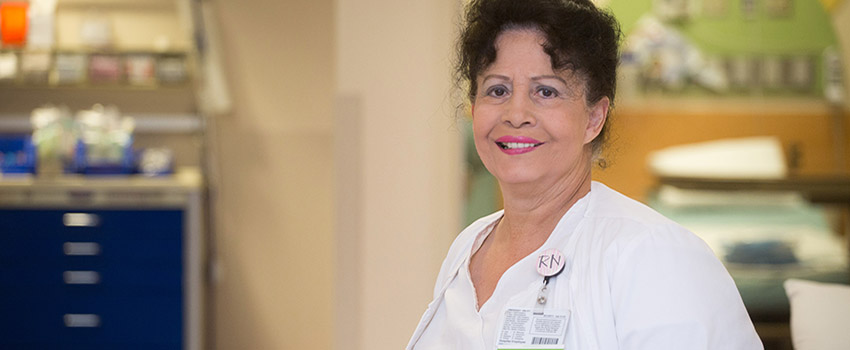Adult-Gerontological Clinical Nurse Specialist

Clinical nurse specialists are advanced practice registered nurses (APRNs) who ensure high quality nursing care that is evidence-based and promotes patient safety, while improving patient outcomes and lowering healthcare costs. They plan this important role across a variety of specialties based on patient population, setting, condition or type of care.
All students in the Adult-Geron Clinical Nurse Specialist track are required to attend one* mandatory Clinical Skills Intensives (CSI) during the fall term in which they are registered for NU 515 and AHN 516.
The clinical skills intensive provides hands-on instruction for common advanced practice assessments and procedures that are applicable to the CNS scope of practice. Instruction is provided by the USA Simulation Program.
Simulation will contact students via JagMail to confirm intent to attend three months prior to the scheduled dates.
Please note the dates are for Clinical Skills Intensives only. The track coordinator may provide orientation dates, which are separate from CSI and Simulation.
The program does not require a thesis or dissertation; however, students are required to complete an evidence-based scholarly project that has a substantial effect on healthcare and patient outcomes. Residency requirements for the scholarly project can be completed in the student’s home region with an approved mentor.
BSN-DNP students complete all support, MSN core, MSN specialty, DNP Core, DNP Project Planning & Development and Residency courses for a total of 62 credit hours. Both MSN and DNP degrees must be completed within seven years. The MSN portion must be completed within the first five years of the program.
MSN-DNP students adding a new specialty must complete the support courses if they have not previously completed the courses in their MSN program. They must complete the specialty courses and support courses, if need, to complete the Post-Graduate Certificate. The DNP core, DNP Project Planning & Development, and Residency courses are required for completion of the DNP degree. This program is a total of 53 credit hours or 62 credit hours if support courses are needed. The Post-Graduate Certificate must be completed within two calendar years. The student has seven years to complete both the Post-Graduate Certificate and DNP degree for this program.
MSN-DNP for Advanced Practice Roles must only complete the DNP core, DNP Project Planning & Development, and Residency courses to complete the DNP degree. This is a total of 36 credit hours. The student has a total of seven years to complete the degree requirements.
| Curriculum |
|---|
| Support Courses |
| NU 518 - Advanced Nursing Assessment 3 credit hours |
| NU 545 - Physio-pathological Basis of Advanced Nursing 3 credit hours |
| NU 578 - Pharmacology for Advanced Practice Nurses 3 credit hours |
| Adult-Gerontological CNS Specialty Courses |
| NU 515 - Clinical Concepts & CNS Role I 2 credit hours |
| AHN 516 - CNS Adult-Geron Practicum I - 180 Clinical Hours 3 credit hours |
| NU 516 - Clinical Concepts & CNS Role II 3 credit hours |
| AHN 517 - CNS Adult-Geron Practicum II - 180 Clinical Hours 3 credit hours |
| NU 517 - Clinical Concepts & CNS Role III 3 credit hours |
| AHN 518 - CNS Adult-Geron Practicum III - 180 Clinical Hours 3 credit hours |
| AHN 519 - Diagnostic Reasoning & Advanced Practice Management CNS - 60 Clinical Hours - ELECTIVE (4 credit hours) |
| DNP Core Courses |
| NU 607 - Scientific Underpinnings of Advanced Nursing Practice 3 credit hours |
| NU 608 - Evidence-Based Practice and Quality Improvement in Healthcare 3 credit hours |
| NU 610 - Healthcare Policy and Finance 3 credit hours |
| NU 613 - Organizational & Systems Leadership 3 credit hours |
| NU 611 - Translating Evidence Into Practice Systems 3 credit hours |
| NU 612 - Clinical Prevention and Population Health 3 credit hours |
| NU 615 - Quality Improvement and Outcomes Assessment 3 credit hours |
| NU 616 - Data Management & Decision Making in Complex Healthcare Systems 3 credit hours |
| Adult-Gerontological CNS DNP Project Planning & Development and Residency |
| AHN 634 - Adult-Geron CNS PP&D 3 credit hours |
| AHN 635 - Adult-Geron CNS Residency I - 180 specialty clinical hours 3 credit hours |
| AHN 636 - Adult-Geron CNS Residency II - 180 specialty clinical hours 3 credit hours |
| AHN 637 - Adult-Geron CNS Residency III- 180 specialty clinical hours 3 credit hours |
The University of South Alabama Master of Science in Nursing (MSN) program provides the skills necessary for a rewarding career. Graduates are eligible and prepared to complete the appropriate national certification exam and apply for licensure to practice as an Advanced Practice Registered Nurse (APRN). It is the graduate’s responsibility to ensure the program meets the requirements to practice in their selected state or U.S. territory.
Contacts
Please feel free to contact Dr. Chondra Russ for more information about this specialty: chondraruss@southalabama.edu.


